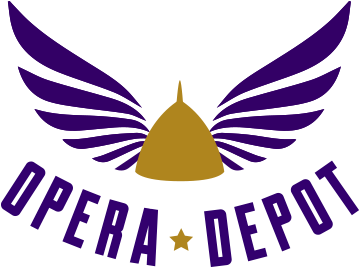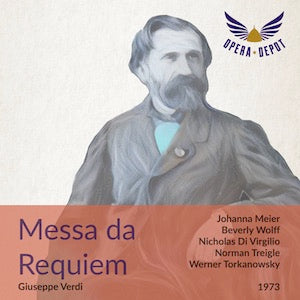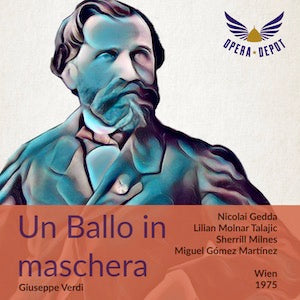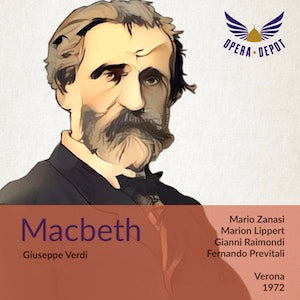Verdi: Messa da Requiem - Meier, Wolff, Di Virgilio, Treigle; Torkanowsky. 1973
$16.95
Listen to a Sample:
Pros:
- The appeal of this performance is the largely American group of soloist assembled.
- Johanna Meier was a unique artist who was at home in almost every vocal style. Here her shimmering soprano sparkles in the "Agnus Dei" and dominates in the "Libera me".
- Norman Treigle left few recordings in the Italian repertoire making this example all the more precious. His voice combines an appealing mixture of darkness and warmth and he manages all of Verdi's vocal challenges with ease.
Cons:
- The sound is a bit murky.
In Mono
OD 11984-2
Treigle Shines
While the overall sound of this performance is less than ideal, hearing Treigle in a new role makes up for it. I became hooked on opera after my first performance in New Orleans of Faust with Treigle as the devil. I saw him many times after that and try to acquire any recording of him I can find. The rest of the cast gave fine performances.
Treigle Shines
While the overall sound of this performance is less than ideal, hearing Treigle in a new role makes up for it. I became hooked on opera after my first performance in New Orleans of Faust with Treigle as the devil. I saw him many times after that and try to acquire any recording of him I can find. The rest of the cast gave fine performances.
Good Performance in Murky, Frustrating Sound!
I wanted to like this: the soloists are excellent as is the conducting, the orchestra is adequate, the chorus is not. But the real problem is the sound; murky is a generous word in this case. Anything Treigle did is worth preserving: he is just as committed and uncompromising here as in his stage roles. Meier, Wolff, and Di Virgilio all have their moments - when you can hear them. The sonic soup prevents one from adequately evaluating their performances. The chorus gets off to a rough start in the opening movement, sinking badly below pitch in the a capella section (when the orchestra reenters it's painful). They improve as the performance progresses. Werner Torkanowsky has some dramatic ideas about this work, but it's all undermined by the recording. For fans of the singers who have a high tolerance for murky sound.
"Day of Wrath"
Werner Torkanowsky, here leading the New Orleans Philharmonic-Symphony Orchestra in 1973, was one of the great, underrated maestri, and this “live” recording presents him at his finest. The exemplary quartet includes Norman Treigle, who had previously sung the masterpiece in 1955 (with Herva Nelli, in New Orleans), 1960 (in Ottawa), 1962 (conducted by William Steinberg, in Pittsburgh), 1967 (opposite Beverly Sills, in Mexico City), and 1968 (under Torkanowsky, in New Orleans), and this was to be the final time he undertook the score. He sings with matchless intensity and an enormous dynamic range. The performance is magnificent.
"Day of Wrath"
Werner Torkanowsky, here leading the New Orleans Philharmonic-Symphony Orchestra in 1973, was one of the great, underrated maestri, and this “live” recording presents him at his finest. The exemplary quartet includes Norman Treigle, who had previously sung the masterpiece in 1955 (with Herva Nelli, in New Orleans), 1960 (in Ottawa), 1962 (conducted by William Steinberg, in Pittsburgh), 1967 (opposite Beverly Sills, in Mexico City), and 1968 (under Torkanowsky, in New Orleans), and this was to be the final time he undertook the score. He sings with matchless intensity and an enormous dynamic range. The performance is magnificent.















